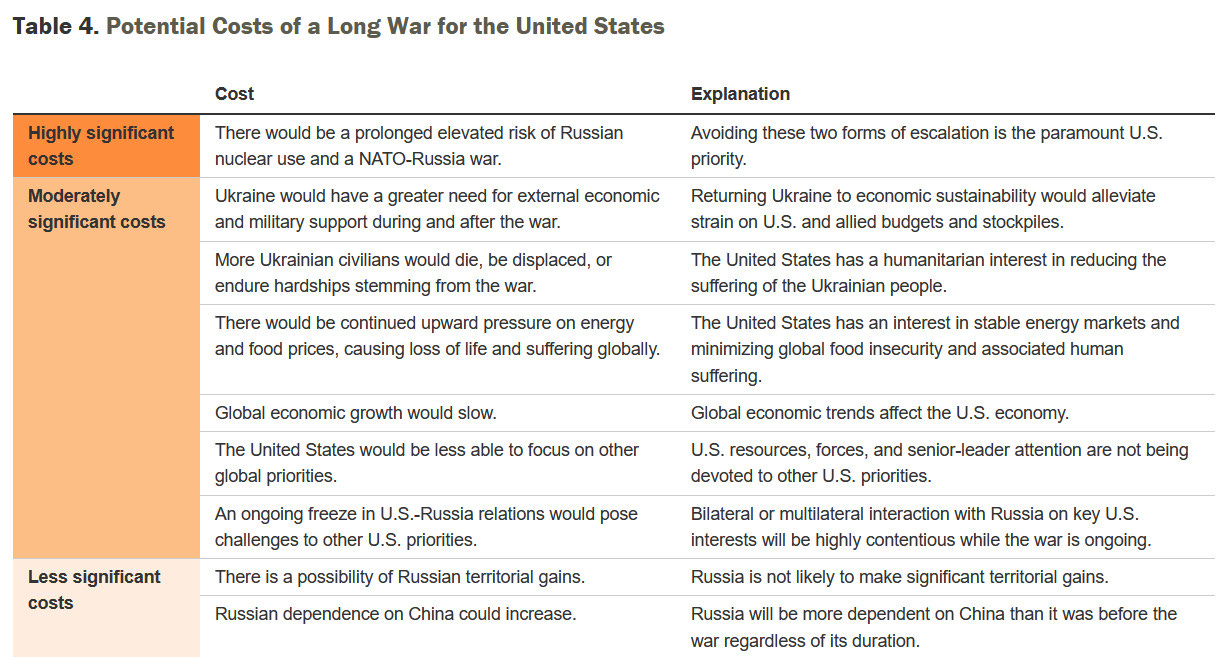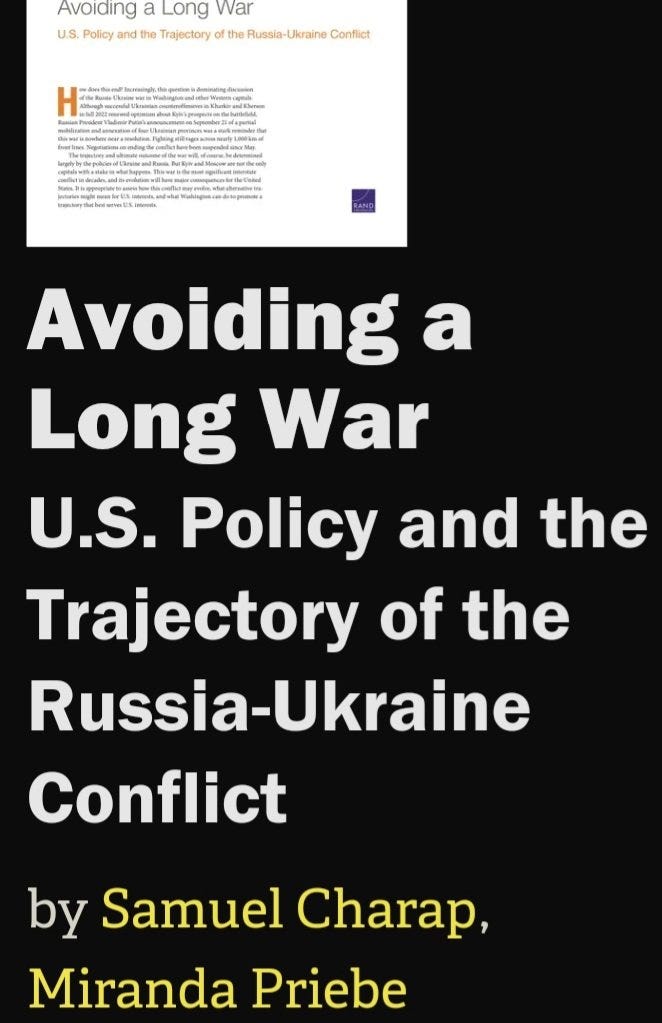The RAND Corporation engages in research and development (R&D) across multiple fields and industries, and is regarded as the premier USA think tank and research institute on military geopolitics and geostrategic affairs as well as a public sector consulting firm.
Just as the collective punishment on the Palestinians (Haaretz 13/11/23), and the post-Operation Al-Aqsa Flood conflict would not defeat Hamas, and that Israel has failed in her bombing campaign in Gaza, Ukraine is facing similar fate whence even RAND is struggling to acknowledge reality that Ukraine defeat is non-salvageable.
A 2019 study by RAND, Extending Russia - Competing from Advantageous Ground, had once recommended to openly arm Ukraine to keep Russia busy. It has been the basis of U.S. Ukraine policy ever since the Wolfowitz Defense Policy reiterated extraordinary efforts were therefore necessary to weaken Russia’s geopolitical position permanently and irrevocably, before it would be in a position to recover, thereby bringing into the Western strategic orbit all of those states now surrounding it that had formerly either been parts of the Soviet Union or that had fallen within its sphere of influence (Excerpts from Pentagon’s Plan: ‘Preventing the Re-Emergence of a New Rival’, New York Times, March 8, 1992; see Ukraine as the Geopolitical Pivot of US Grand Strategy, Malaysia New Left, 13th. March 2022).
This imperialism gradeur would eventually, with inputs since 1996, from Paul Wolfowitz, Dick Cheney, Donald Rumsfeld, and Richard Perle created a new think tank called “The Project for a New American Century.”
However, by early 2023 RAND had turned a corner and argued that a prolonged war in Ukraine will be too costly for the U.S. to sustain:
The Ukraine problem is primary President Vladimir Zelenski has had rejected any and all negotiations with Russia.
On this aspect, one needs to argue that proposed peace negotiation initiative as no more than to maintain, and perpetual, US hegemony over the resource-rich and geostrategic Eurasian hinterland; read Brzezinski's Mad Imperial Strategy.
Less one forget, Russia and Ukraine may have agreed on a tentative deal to end the war as early as April 2022, according to an article in Foreign Affairs by Fiona Hill and Angela Stent whence (resonsiblestatecraft 2/09/2022),
“Russian and Ukrainian negotiators appeared to have tentatively agreed on the outlines of a negotiated interim settlement,” whereby “Russia would withdraw to its position on February 23, when it controlled part of the Donbas region and all of Crimea, and in exchange, Ukraine would promise not to seek NATO membership and instead receive security guarantees from a number of countries.”
That news highlights the impact of former British Prime Minister Boris Johnson’s efforts to stop negotiations, as journalist Branko Marcetic noted on Twitter.
The decision to scuttle the deal coincided with Johnson’s April visit to Kyiv, during which he was reportedly urging Ukrainian President Volodymyr Zelensky to break off talks with Russia for two key reasons: Putin cannot be negotiated with, and the West was not ready for the war to end.
The RAND study had foreseen such a situation and had deviced approaches to pivot and push Ukraine towards talks with Russia:
[T]he United States could decide to condition future military aid on a Ukrainian commitment to negotiations. Setting conditions on aid to Ukraine would address a primary source of Kyiv's optimism that may be prolonging the war: a belief that Western aid will thecontinue indefinitely or grow in quality and quantity. At the same time, United States could also promise more aid for the postwar period to address Ukraine's fears about the durability of peace. Washington has done so in other cases, ...
...
Linking aid to Ukrainian willingness to negotiate has been anathema in Western policy discussions and for good reason: Ukraine is defending itself against unprovoked Russian aggression. However, the U.S. calculus may change as the costs and risks of the war mount. And the use of this U.S. lever can be calibrated. For example, the United States could level off aid, not dramatically reduce it, if Ukraine does not negotiate. And, again, a decision to level off wartime support pending negotiations can be made in tandem with promises about postwar sustained increases in assistance over the long term.
President Zelenski is, however, unwilling to take up the peace talks. If he can be pushed out of office during the next few months his likely replacement, General Zaluzny, will prbably be more inclined to seek an end of the war.
Thus the current tactic is to pressure Zelenski into leaving by withholding all future funds. If another Ukrainian leader comes in, aid might again flow to prevent a total takeover of the country by Russia.
In pursuit in this direction, RAND early this year, published a study about how to end the war in Ukraine:
DOWNLOADABLE pdf file HERE.
Meanwhile, Strana has published (machine translation): Volodymyr Zelensky decision to address US senators, according to the Washington Post and The Hill, 4/12/2023.
It was reported that President Volodymyr Zelensky would address US senators via video link with a request to approve more financial assistance to Ukraine....
Twelve hours later, however, at 21:43 local time, this piece came out:
President of 8 Volodymyr Zelensky canceled his speech to lawmakers scheduled at the last moment.
This was even as POTUS pushed to replenish Ukraine’s war chest and send aid to Israel, this executive action was in vain, and collapsed in the Senate where Republicans were blocking the funding unless the Democrats agree to add strict measures to clamp down on migration at the U.S. border with Mexico.
Z was zilched.
Publications posted during the week:
3] Iran's strategy adopted in response to the changes in US-China relations
4] China’s grand strategy in Asia and beyond
5] China’s foreign direct foreign investment across the Mediterranean region
6] Europe-China Relations at the Beijing Summit
7] Trading on Terror: short share selling in midst of the October 2023 Hamas-Israel war
8] MOMENTUM and FRIDAY FILES
Kindly circulate this journal among your friends and 1’ groups.
Terima kasih.
Thank you for reading postings On Geoeconomics. This post is public - share it or subscribe for free articles to sustain my research-writing.





